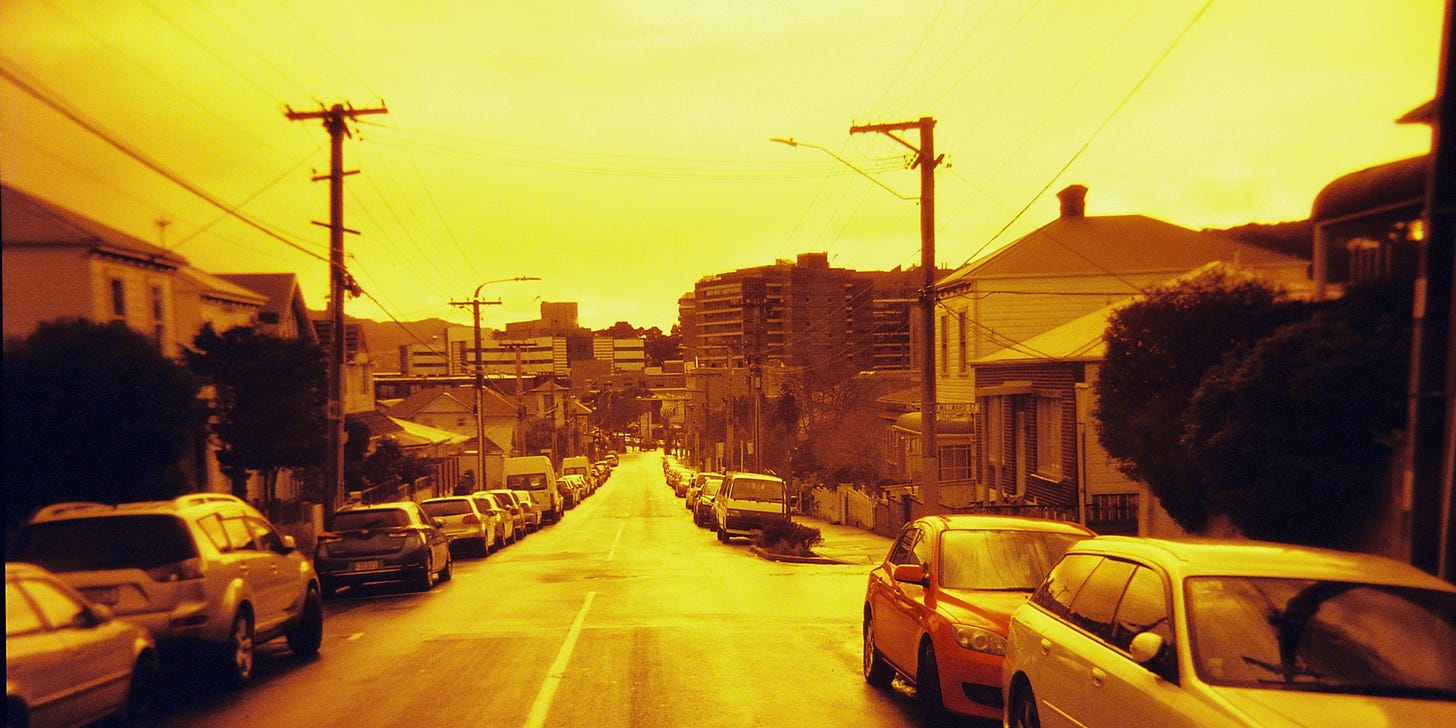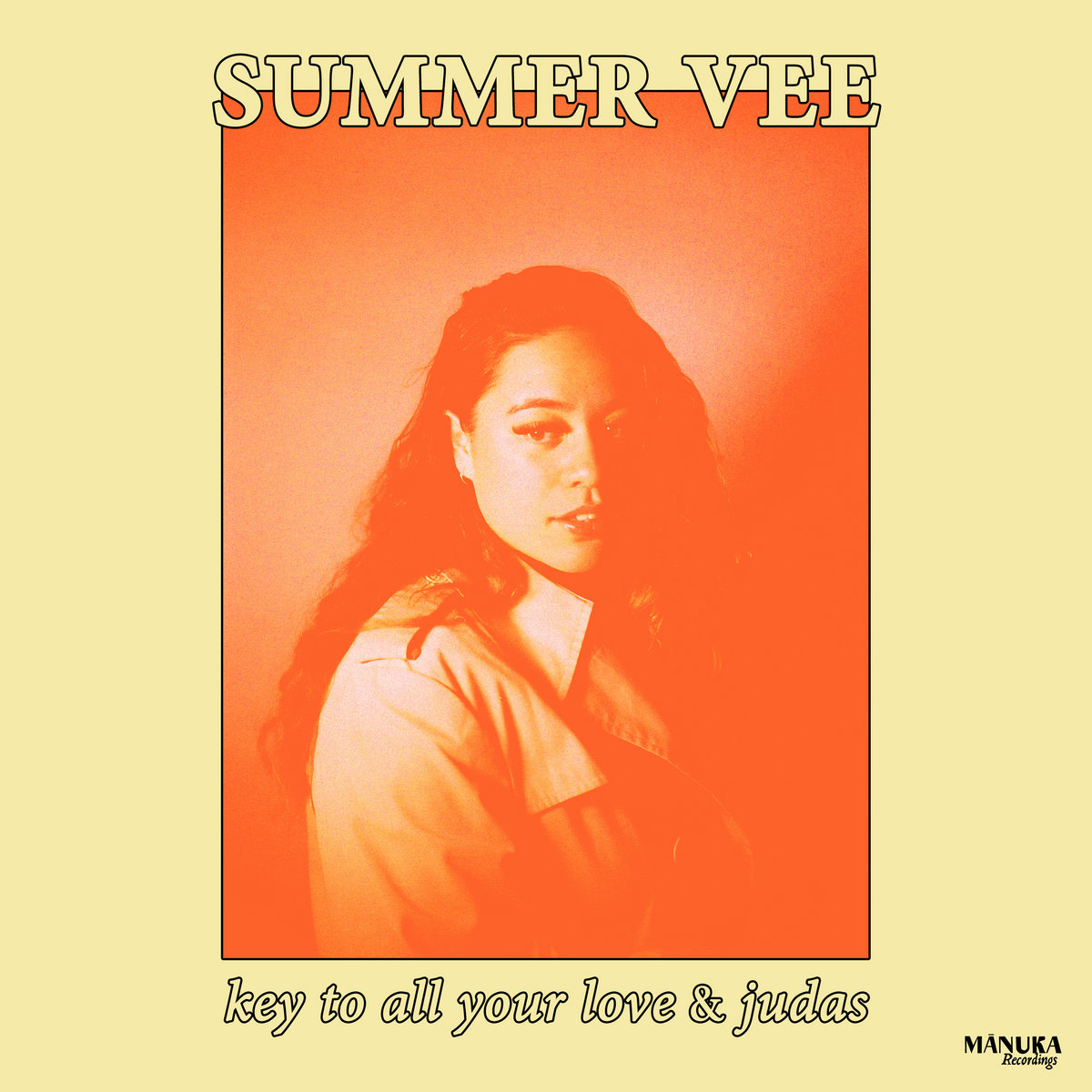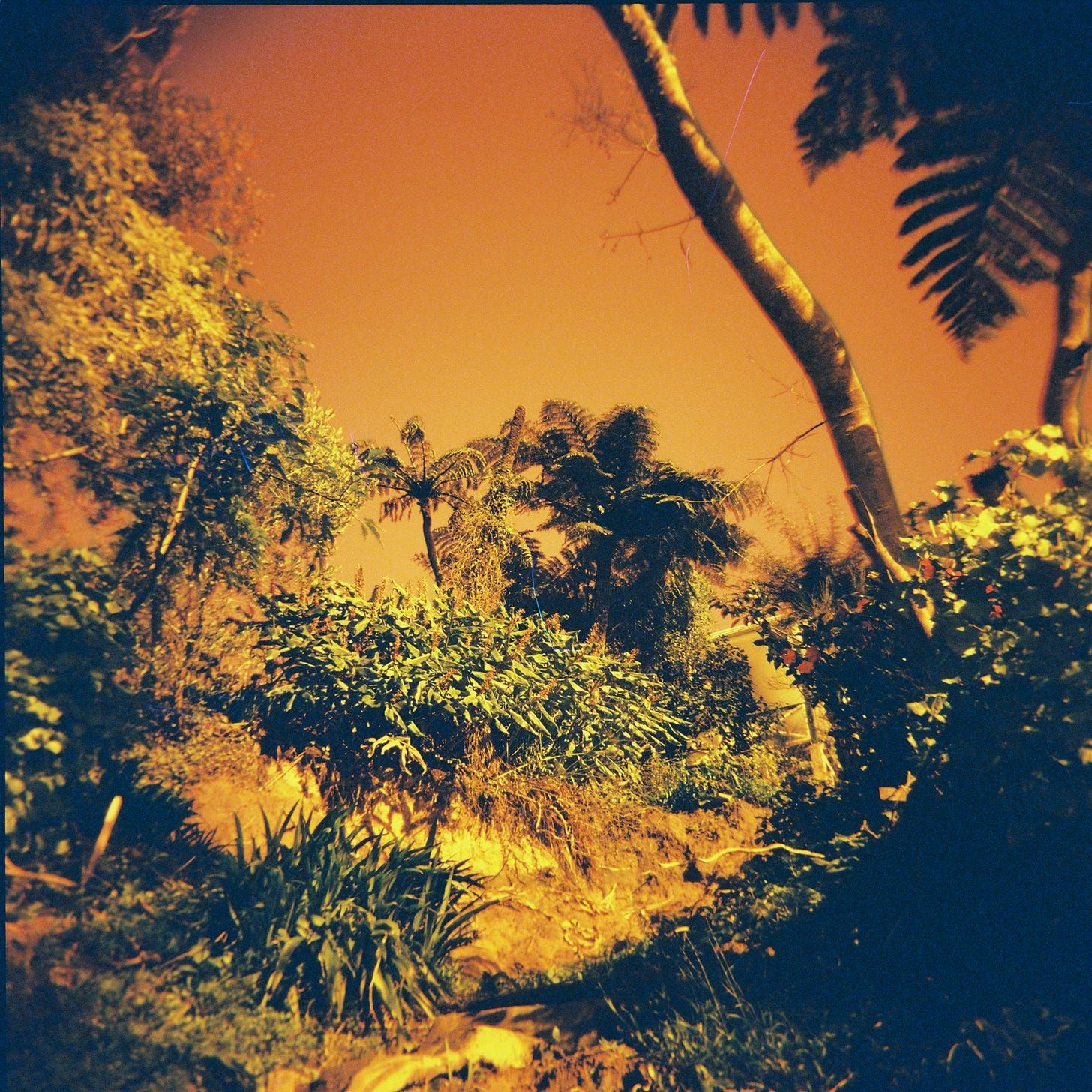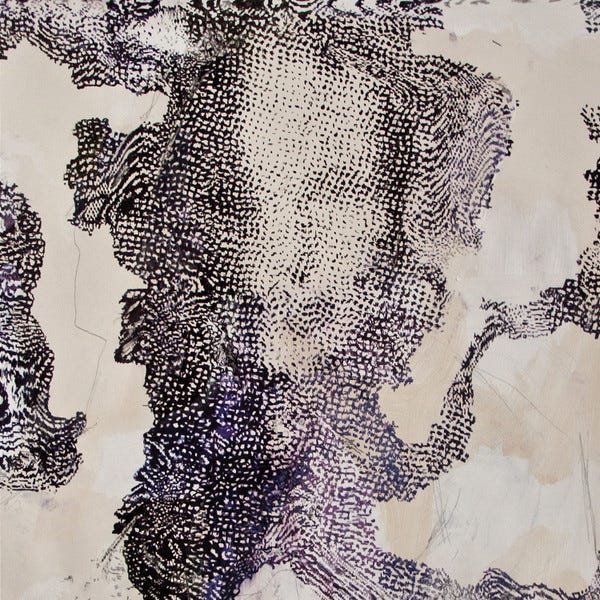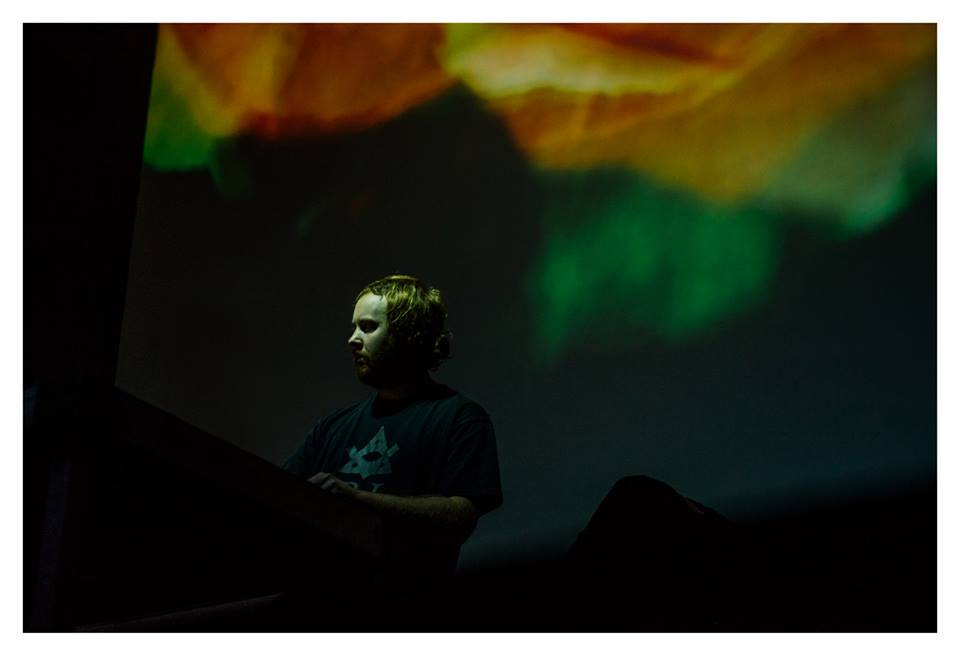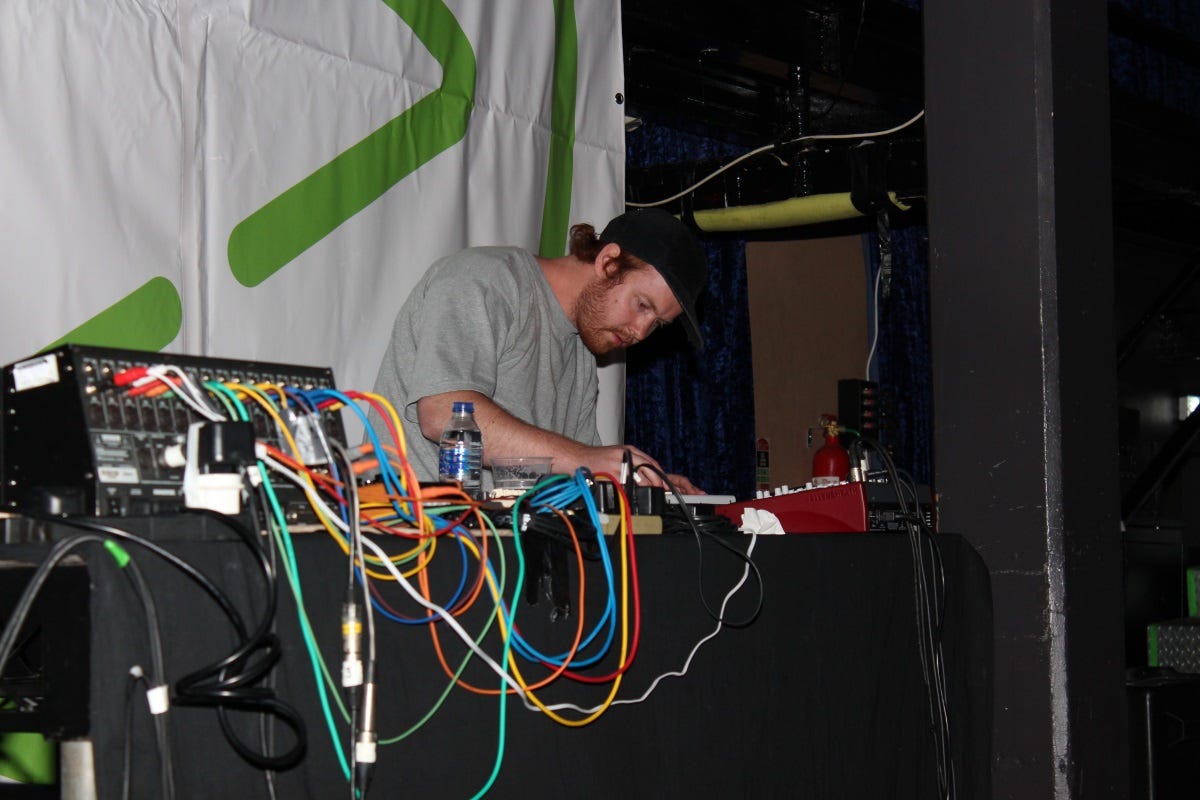Monday Beats + Pieces
Mānuka Recordings, some beats, some pieces.
Selected Works is a weekly (usually) newsletter by the Te Whanganui-a-Tara, Aotearoa (Wellington, New Zealand) based freelance music journalist, broadcaster, copywriter and sometimes DJ Martyn Pepperell, aka yours truly. Most weeks, Selected Works consists of a recap of what I’ve been doing lately and some of what I’ve been listening to and reading, paired with film photographs I’ve taken + some bonuses. All of that said, sometimes it takes completely different forms.
WHAT I’VE BEEN DOING:
Last week, I helped a new Tāmaki Makaurau, Aotearoa (Auckland, New Zealand) based boutique record label, Mānuka Recordings, prepare the copy text for their debut release Key To All Your Love/Judas by the singer-songwriter and guitarist Vaha'akolo aka Summer Vee. You can read the text we came up with below.
Mānuka Recordings is a new boutique record label from Tāmaki Makaurau, Aotearoa (Auckland, New Zealand). Led by Dylan Biscuit and Kenny Sterling, we are inspired by the rich histories of seventies and eighties dance music, ranging from soul and R&B to disco-funk, boogie, vocal house and beyond. As a collective, we’re focused on supporting and collaborating with musicians in our immediate community, pushing artists’ boundaries, and searching for the magic within spontaneity and imperfection.
For our inaugural release, we present two slices of slow-burning rhythmic soul and mellow boogie from the Tāmaki Makaurau singer-songwriter and guitarist Summer Vaha'akolo aka Summer Vee, Key To All Your Love/Judas.
Previously best known for her viral youtube demo ‘Euphoria’ and contributing ‘Aint The Same’ to the soundtrack of the well-loved The Panthers drama miniseries, Key To All Your Love/Judas sees Summer delivering on her promise as one of the most exciting young vocalists in Aotearoa. On the A-side, ‘Key To All Your Love’, she connects with a cast of collaborators, including Mānuka Recordings' in-house arranger and producer Kenny Sterling, drummer Julien Dyne and saxophonist JY Lee. On the flip-side, ‘Judas’, Summer revisits this fruitful creative partnership with the addition of backing vocals from Lijah Mavaega.
Key To All Your Love/Judas is available for digital purchase, or in a limited edition of eighty 10” singles, with art direction provided by Dylan Biscuit and Kenny Sterling.
BEATS:
Here’s a lovely reissue of legendary Japanese jazz singer Noriko Miyamoto’s 1978 masterwork, Push. Produced by the equally legendary and talented Isao Suzuki, Push landed at a moment when Japanese singers like Kimiko Kasai and Yasuko Agawa were making the jump from jazz into the pop market. Twelve years later, Noriko fulfilled her long-held dream of becoming a soul singer after she moved to the US and joined a number of prestigious outfits, such as Eddie Murphy’s band, Graham Central Station, the Brothers Johnson and Side Effect. Push, however, is where the journey really began.'
How about an absolutely bonkers compilation of lo-fi drum computer folk, disco-pop-lounge, haunting ballads, obscure vanity pressings, and synthesized string ensembles? Smiling C Records and curator Charles Bals (creator of the inimitable Club Meduse) have absolutely outdone themselves here with this collection of husband & wife duos, pub legends, one-man bands, preachers’ sons, and country-lounge entertainers. The American Dream Reserve is a very special place indeed.
Over five tracks, London DJ/producer Shy One (and friends) explore the history of UK sound system and club music from Street Soul to Grime, stopping off within the UK Garage and West London Broken Beat hotspots along the way. If Soul II Soul, 4Hero, Loose Ends and Roll Deep walked into a bar, commandeered the aux and played each other their favs, the vibe would be a bit (or a lot) like this.
Here’s a couple of lush, long-form oddities from the Kaş, Turkey-based multi-instrumentalist, Misha Sultan, fittingly cued up for release next month through the Patience / Impatience imprint. They’ve described the A-side ‘Not Every Lake Dreams Of Being A Magic Swamp’ as “an invitation to contemplation,” which feels about right. Reverberating guitar figures, foggy synth pads, bells, chanting, the breakdown, flip and rebuild. Misha’s working with multiple movements within each piece here, and the results are divine and resplendent.
PIECES:
Soothing Apocalypse: The Indonesian summer is very hot. It’s when our writer usually shelters at home listening to music, only to realize that the state between slumber and consciousness can not be as innocent as it used to be. Gisela Swaragita for Norient.
The Language of Music: Music is more than melody, harmony and rhythm. For Hii Mag, Adrian DiMatteo looks at music as a tool to communicate: before language, as a loon call in war, as a way to indicate seasons and more.
Hybrid Rose’s Hyperpop Fantasy: Madeleine Crutchley interviews Te Whanganui-a-Tara-based musician Hybrid Rose for The Pantograph Punch, on her latest album and the pop songs and divas that have influenced the hot new sound of HyperKunt.
Interview / Ron Trent / Warm / Music & Power: Ron Trent recently released his first long-player in over a decade, What Do The Stars Say To You, under the alias WARM. It’s a record that Ban Ban Ton Ton’s Dr Rob gave a glowing review, which in turn gave him the chance to speak to Ron in person.
Track by Track - Michael Diamond: Fresh from being listed as one of Gilles Peterson’s ‘Future Bubblers’ under Brownswood Music, Michael Diamond released his concept album Third Culture – an LP backed by Youth Music & Arts Council England exploring the concept of cultural identity – this June. He talked through the album track by track with Nicola Phillips for Kaltblut Mag.
EXTRA EXTRA:
After eight years of service, Aidan Hanratty has concluded his Bandcloud newsletter series and monthly radio show on Dublin Digital Radio. Between 2014 and 2022, Bandcloud provided a weekly round-up of new interesting music on Bandcamp and Soundcloud. Over the years, Aidan supported releases from a bunch of my friends and people I admire, and I’d like to thank him for that. You can read his final entry here.
Tāmaki Makaurau, Aotearoa-based krautrock/kosmische musik super-group Half Hexagon’s debut single ‘Ism’ is up on the net now. Check it on Bandcamp here.
I’m on the radio sometimes.
THROWBACK FILES:
Beneath the blue quicksand: Fis discusses his debut album
Back in 2015, I interviewed the Ōtautahi, Aotearoa-born composer, producer and DJ Olly Perryman, aka Fis, for Dummy Mag. This was my second feature story for Dummy, and I remember it being a real thrill to wake up and see it live on the site. I often forget how close I came to giving up on music journalism in the mid-2010s. In so many ways, getting to write for Dummy was a lifeline and a reminder to keep going. Seven years later, I’m resharing it here.
Since first captivating imaginations within the forward-leaning electronic music community at the start of the decade, Berlin-based New Zealand producer and DJ Olly Peryman, aka Fis, has released a steady stream of cult EPs and remixes. Throughout his ever-shifting musical catalogue, unstable rhythmic structures, atomised melodies, and punishing sub-bass intertwine into an immersive soundworld all his own. It isn't always comfortable listening, but it's afforded him the opportunity to play shows throughout his home country, Australia, Europe, and the UK, bewildering and inspiring audiences in equal measure. "I think my music has yet to find its appropriate setting to be performed live," he admits. "I played at the Berlin Atonal Festival in May. That's probably the closest it's come. Maybe it doesn't need to?"
In 2012 Peryman released his 'Duckdive' and 'The Commons' EPs via open-eared drum and bass labels Samurai Horo and Exit Records. They deployed him on the absolute fringes of the genre, but not for long. Over 2013 and 2014, his 'Homologus' EP with Void Coms, and his 'Preparations' and 'Iterations' EPs with Robin Carolan's influential Tri Angle Records repositioned him within a space of club music deconstructions and beautiful desolation. Changing tact again, Peryman's final record for 2014 was 'Speech Spirits', a slice of violently techno-ecological electronica inaugurating new London label Loopy.
Skyping with me from the apartment he shares with his girlfriend, Perryman is ready to make a few admissions about his music, and address some misconceptions. "It's been framed as deconstructed club music that gets played in a club, but it's actually not," he says, speaking in a soft and reflective tone. "I realised yesterday that I've never been interested in deconstructing club music. It's been years since there has been any relationship between my music and drum'n'bass. I have, however, been complicit in that idea being associated with my music, almost to the extent where it's become definitive in some circles. If I pause and reflect, I've never been interested in that. It's always been a far more personal thing for me."
"[My music has] been framed as deconstructed club music that gets played in a club, but it's actually not. I've never been interested in deconstructing club music." – Fis
How personal Perryman's music gets becomes crystal clear while listening to his Loopy released debut album 'The Blue Quicksand Is Going Now'. Staggering in detail, scope and emotional depth, he brings polychromatic life to a techno-naturalistic soundworld all his own. Song-by-song, the cycles and dynamics of nature re-emerge as ecstatic electronic noise. While writing it, Perryman began the process of sonically cleansing himself of ego and negativity – "the blue quicksand", as he refers to it (we'll come back to that later on, though).
When Perryman first spoke to Dummy in late 2013, he was on the verge of releasing the first of his two EPs with Tri Angle Records, and his one-sided etched 12" with Void Coms. Outside of music, Perryman was working part-time in a junior faculty role at Victoria University of Wellington's Te Kura Māori school (a centre for teaching and research related to Māori and Pacific Island education, policy, and practice) and working evenings and weekends at a bottle store. He spoke keenly about identity and geography politics, processing trauma through music, creative time as meditation, and the importance of physical response as a guideline within his music-making.
Written from a language-less place that positioned feeling ahead of thought, his 'Preparations', 'Iterations', and 'Homologus' EPs worked to extend the vanguard of exploratory music. Where Perryman's early releases on Samurai Horo and Exit Records used the residue of an interest in drum'n'bass to fashion rhythmic-grid defying textural abstractions, this trilogy of EPs articulated a ravaged digital psychedelica singular in nature, confirming his status as a crucial new talent in the process. Claustrophobic, cavernous, windswept, and somehow still teaming with life, Perryman's emotionally hulking music was compelling yet mysteriously guarded. Between his statements and sound, you could tell he was working through things. He just wasn't quite ready to take us deeper into his interior world. That would come soon enough.
With touring opportunities coming in off the back of those newer EPs, Perryman temporarily decamped from New Zealand to Belgium. Basing himself out of his uncle's converted stable, he spent three months performing across Europe and the UK and helping out with renovations around the property. As the weeks passed, Perryman began to feel increasingly conflicted. "I take sound, frequency and vibration pretty seriously as forces," he explains. "I feel like if someone is making music, that music is making them back in return. As a producer, you're feeding frequencies into your body for hours a day. That's going to do something to you. I was having these realisations about the kinds of frequency and vibrational contributions I wanted to make. The music I was playing wasn't very consistent with that. It was pretty dark and aggressive. I didn't feel like broadcasting the frequencies of a person in that kind of state anymore."
In juxtaposition to his growing discomfort, show after show Perryman found himself connecting with amazing individuals. "Something weird was going on in a great way," he recalls. "Some of the people I met are now really close friends of mine." As they talked, he often found they were a similar age to him, and going through a process of change within themselves, not unlike his own personal shifts. "It was quite reassuring and reaffirming for me," he continues. The conversations were natural, like those of old close friends catching up. Inevitably, they would admit they felt like they already knew him through his music. "It was warming because I've always thought that pouring your heart into it was just how you made music," Perryman enthuses. "Maybe there was something portable in the music that was bigger than sound. I feel a bit uncomfortable making that kind of claim about the music, but if it's true, then that's nice."
Inextricably interwoven, his feelings of unease, reassurance and affirmation led the way with 'The Blue Quicksand Is Going Now'. Inspired by his experiences on tour, and his sense that things needed to change within him, he returned to New Zealand to complete the album. Back in his hometown of Christchurch, Perryman supported himself by spending a summer working in construction and helping his brother establish an urban permaculture mentorship program. "We've always grown food at our family home," he reflects. "My dad always used to get us to help in the vegetable garden as children. It's hard to pick the exact point where my interest in permaculture kicked off because it's always been around me. I love gardening and have a lot of faith in it."
As of lately, it's come to his attention that both sides of his family have been involved in gardening and farming for generations. Given his interest in permaculture and a lineage of ancestors who lived in connection to – and with an understanding of – our natural ecology, it's no surprise it factors into his musical output. "I'm someone who spends a lot of time thinking and feeling ecology and being in living systems," he says. "They really matter to me, so they are in my system when I create. There is a huge relationship between these interests and my music. It hasn't been fully conscious this whole time, but I'm realising how much of it is a part of what I do." In Berlin, he's continuing to cultivate these interests through establishing permaculture systems inside and around some of the city's industrial power plants and warehouses turned nightclubs. "I've just been speaking with the people who run Tresor," he says. "I've got the go-ahead to establish a garden farm system around their precinct."
"I'm someone who spends a lot of time thinking and feeling ecology and being in living systems. There is a huge relationship between these interests and my music. I've been speaking with the people who run Tresor; I've got the go-ahead to establish a garden farm system around their precinct." – Fis
The extent to which Perryman's thoughts and feelings about ecology intertwine with his musical approach is pivotal to the sound and structure of 'The Blue Quicksand Is Going Now'. From the opening title track to the last audible moments of album closer Kal, Perryman revels in the beauty of the natural world, using it as a catalyst for personal change. "The title of the album is everything," he explains. "It's basically about the negative energies you can have in your system starting to go. I was over social anxiety, ego, and narcissism. Like any phase you go through [in life] where things aren't right, maybe it all has a larger purpose. Sometimes you have to go through something to understand your relationship to it. I think when I made those EPs I wasn't mature enough to be dealing with the things that were frustrating me in my life. If you make dark, brooding, and aggressive music, you'll probably end up being all three. As you know, I believe in sound as a creative force. Eventually, I chose to be happy, and I wanted to be healthy. I wanted to make something that makes me feel better and does the same for other people as well. Thankfully it's really worked."
Looking back on the ravaged desolation, claustrophobia and aggression of some of his releases, Perryman philosophically frames them as having clear the way for 'The Blue Quicksand Is Going Now'. "In order to put better energy into your music, you have to start to generate better energy within yourself," he says. "It's one of those things that rests on simple acts like forgiveness. Forgiving yourself and other people, and forgiving your previous works as well. I choose to turn around, look at every release I've had and be at peace with them. They all matter in some way, they're all allowed to be there, and they're all allowed to be part of my story. They mark out different points of tone and different stages of my writing."
In his 'The Blue Quicksand Is Going Now' stage, Perryman's primary writing concern is staying clear and present in the now. "You can be there with the moment a track is being created," he says. "A track has its own present, and its own frontier of becoming. You can be right there at the edge of that with it. It's like watching from beachside as waves roll on in."
Loopy released 'The Blue Quicksand Is Going Now' on June 31st 2015 (buy).
FIN.


